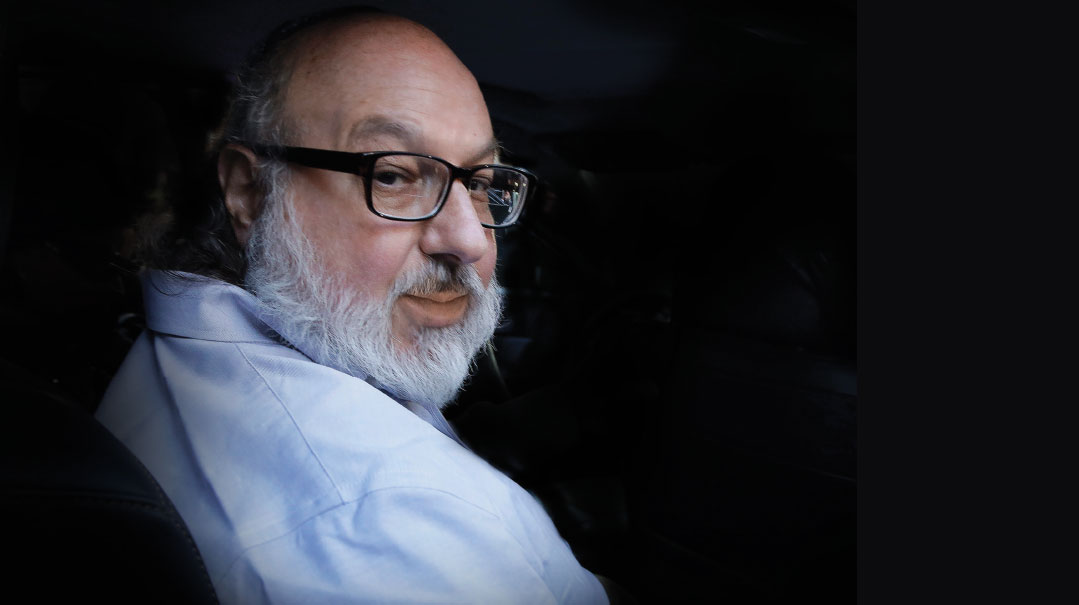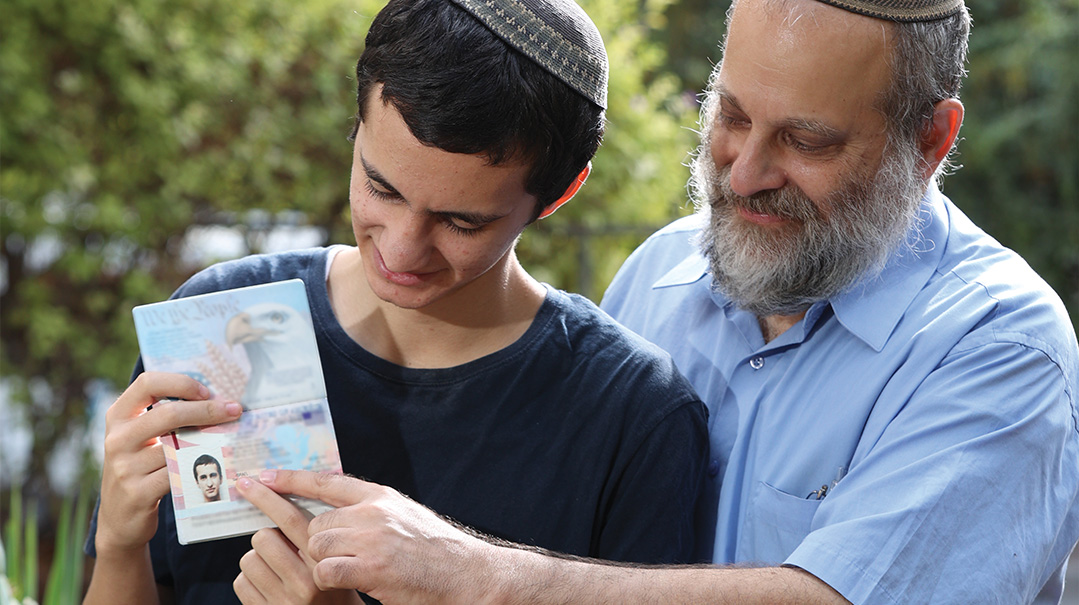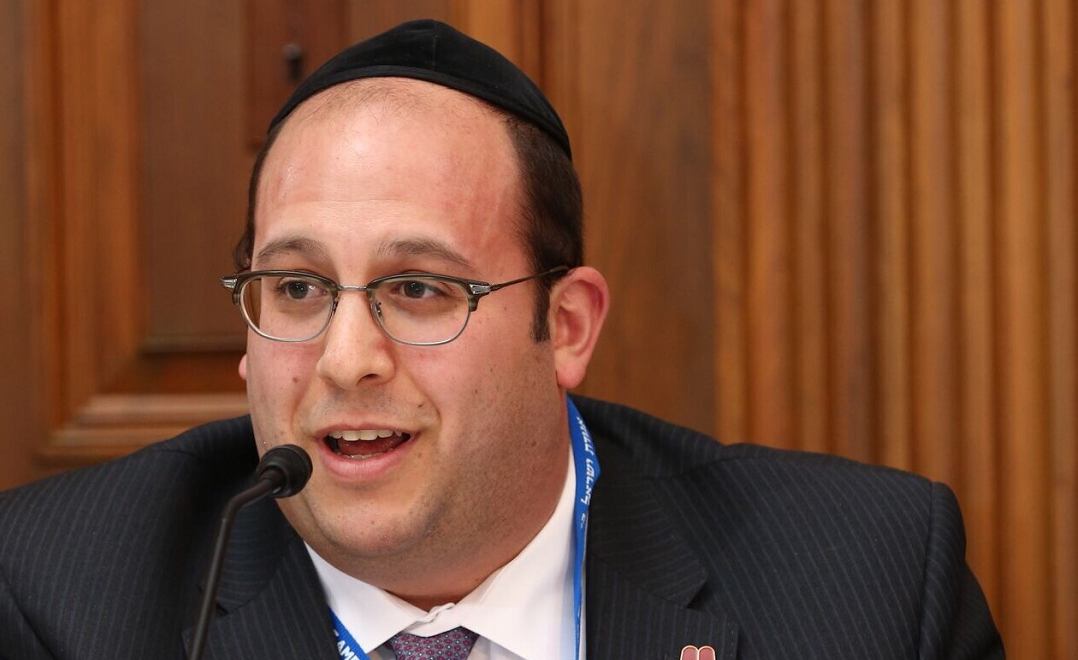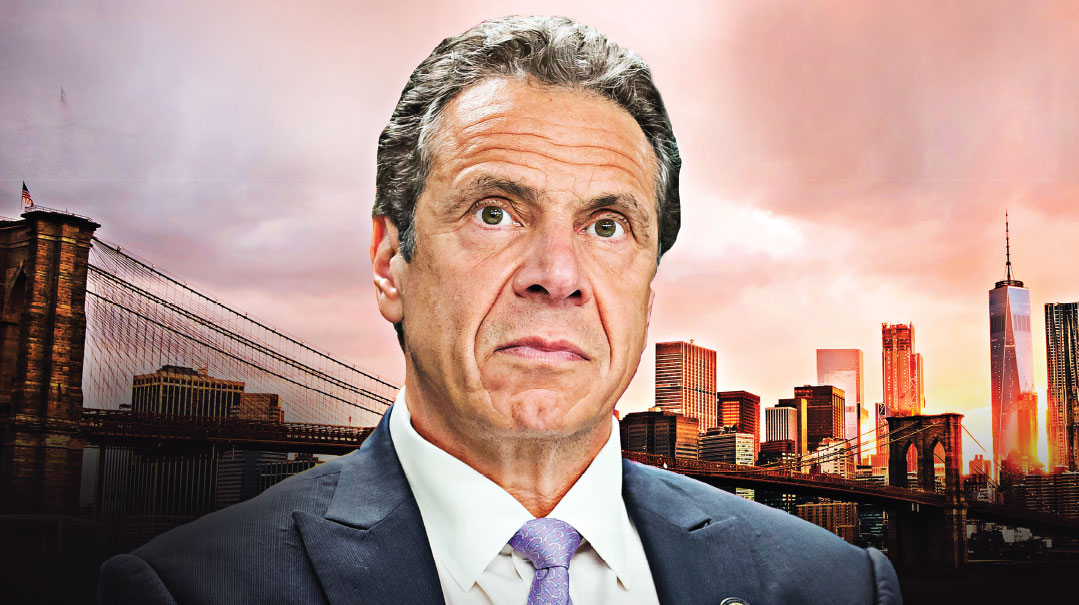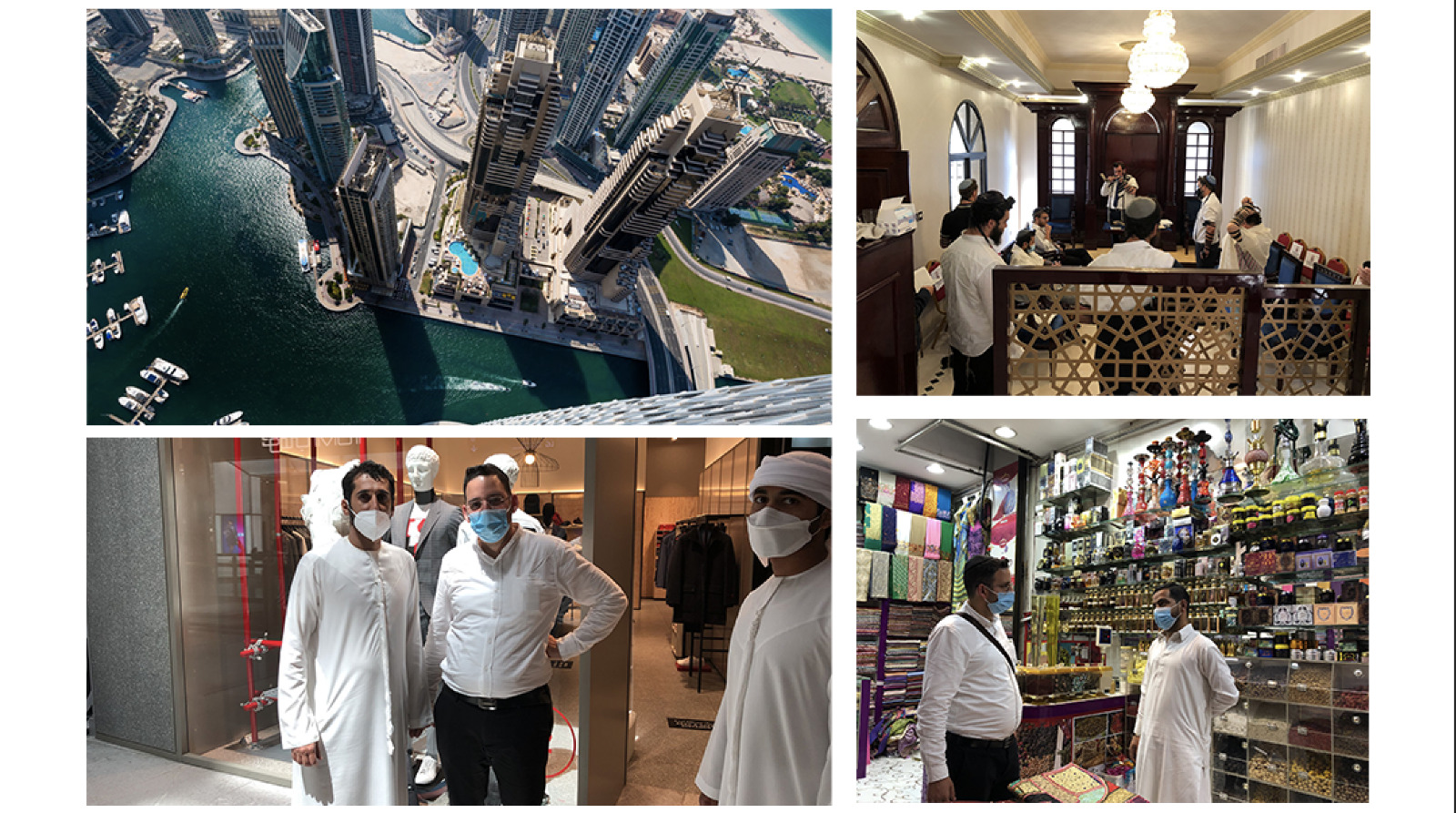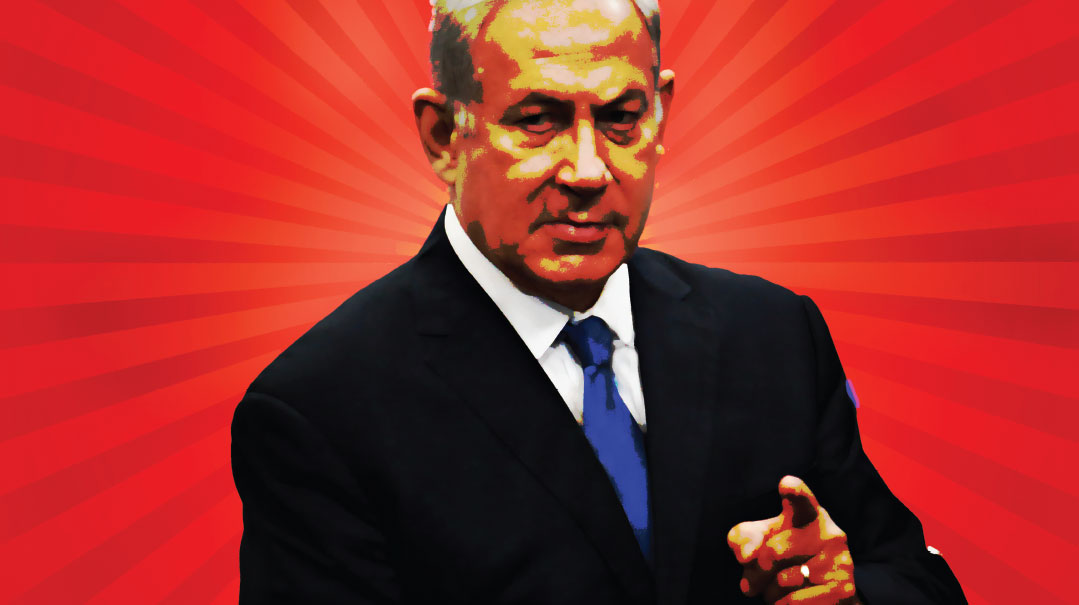Can We Talk?

In Ramallah, they don’t especially like outside journalists, and certainly not those dressed in religious attire. But a Deal of the Century doesn’t happen every day, and besides, a caravan was waiting to take us into the PLO’s inner sanctum
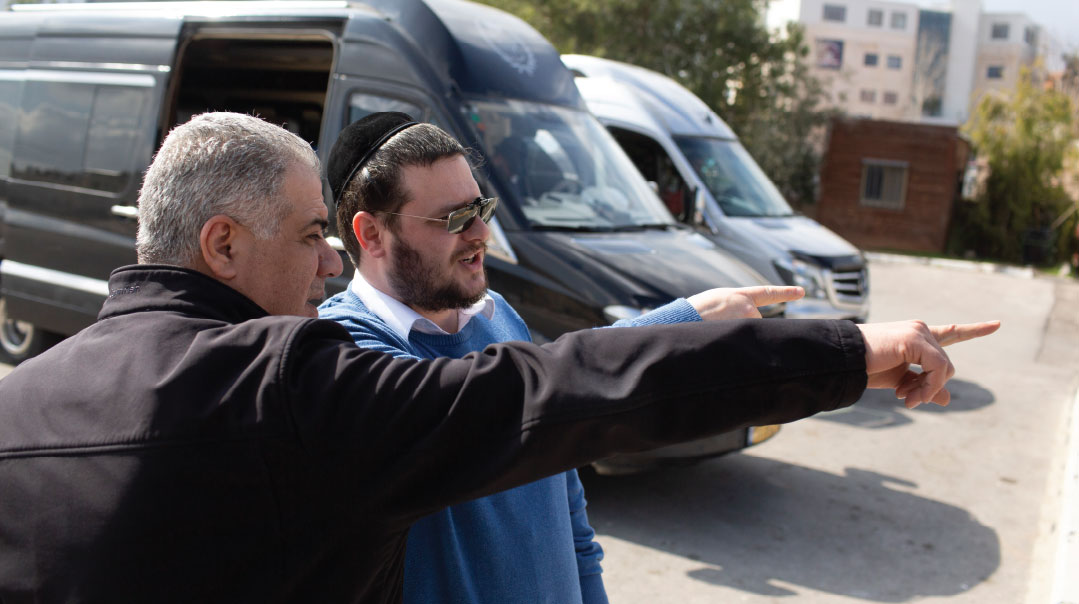
Just two weeks ago, I spent a chilly winter afternoon in Ramallah. I had no illusions that I’d depart the city with a dove and olive leaf in hand; the Palestinians have proven that they aren’t genuinely interested in peace. But I did want to gauge the mood firsthand and get the Palestinian take on an American president with a decidedly different approach to the world’s most famous conflict.
Ramallah welcomed us with pouring rain, our vehicle bumping its way over the muddy potholes of the Bir Nabala neighborhood. But as we neared the central part of the city, the poverty and neglect gave way to more modernized urban scenery. The road was smoother, and the crowded apartment buildings were replaced by tall buildings, luxury hotels, and shopping centers packed with local customers.
Just about ten minutes past the IDF border checkpoint, we arrived at our first stop: the Mukata presidential compound, which is also home to the gravesite of arch-terrorist Yasser Arafat and the national museum that bears his name.
Upon emerging from the vehicle, it quickly became evident that my yarmulke was making my hosts nervous. Later, Brig. Gen. Shalom Harari, a personal friend and expert on the Arab world, explained to me that the Arabs see chareidi garb like a finger in the eye. They don’t distinguish between settlers and chareidim — any kippah-wearing Jew is a settler in their eyes. “The caricatures in the Palestinian media depict the Jewish settler wearing a shtreimel with a beard and peyos,” he said.
But despite whatever political undertones my dress did or didn’t carry, our hosts continued to escort us — quickly — to a conference room on the compound’s lower floor. There we were greeted by three senior Palestinian Authority officials: communications minister Nabil Abu Rudeineh; former prisoner affairs minister Ashraf Al Ajrami; and Elias Zananiri, vice-chairman of the Committee for Interaction with Israeli Society.
Back to the Table
Although all of the gentlemen in the room speak Hebrew fluently — many have mastered the language during stints in Israeli prisons — some of them, notably the more senior ones, made sure to reply to our questions in Arabic. Taleb el-Sana, a former Knesset member from the Ra’am-Ta’al party, who has become an advisor to PA leader Abu Mazen in recent years, translated. To no one’s surprise, the conversation was a frustrating exercise in veiled threats, accusations, and historical revisionism.
My first takeaway: Trump’s peace plan is worrying the Palestinians. After years during which the State of Israel was pressured to make more and more concessions to prove that it wanted peace, it’s now the Palestinians’ turn to prove they are serious. It’s clearly addling them.
“If we make it clear to our people that you’ve buried the two-state solution,” they told us, “the entire region will regress to the violence of the 60s and 70s.”
With that threat as an opener, it was only natural that our dialogue got a bit heated.
“You’re the ones who buried the idea of peace,” I responded. “You squandered every opportunity you were given.”
“That’s a lie,” Elias Zananiri replied. “From the days of Prime Minister Yitzchak Rabin to the days of Ehud Olmert, there wasn’t a single Israeli leader who agreed to advance the peace process.”
“Ehud Barak promised you everything, including the holy sites of Jerusalem,” I said.
“Barak torpedoed it all,” Zananiri insisted. “You know why? Because of the mantra he sold to the Israelis when he returned from Camp David — that there is no partner on the Palestinian side. He claimed that he gave the Palestinians everything and they rejected it.”
“And he was right,” I said. “He promised you everything you wanted. Even Bill Clinton was stunned at the extent of the concessions Barak was willing to agree to.”
To this indisputable fact, as well, they had a ready response: “He was just pulling a stunt. He wanted to prove that we’re not serious. If we would have been convinced that his offer was serious, we would have gone along with him. The only one who showed he was serious was Ehud Olmert.”
Nabil Abu Rudeineh, official spokesperson for Abu Mazen, added, “If the State of Israel will agree to the establishment of a Palestinian state whose capital is Jerusalem, the PA will be ready to sign a deal in two weeks. But we’re dealing with an Israeli government that is destroying all chances for peace. What gets us the angriest is that the American administration, which is supposed to be a fair mediator between us, is pushing Israel and the Palestinians toward permanent conflict. We want leaders like Rabin and Peres, who will negotiate with us.”
“So,” I got back to the current matter, “what is your opinion of President Trump’s deal?”
“The conflict will not be resolved through a deal presented by the Americans, but rather through negotiations between Israel and the Palestinians,” Abu Rudeineh said. “We are at a crossroads, where Israel has to decide if it is choosing peace or an ongoing conflict. Our president wants peace. After Abu Mazen, it will be hard to find a leader who will be willing to sign on the American conditions.”
Not So Black and White
The ping-pong discussion continued for some time, giving us a taste of what Israel’s prime ministers endure at the negotiating table. We concluded, of course, with no conclusion. It’s close to impossible to come to any agreement with people who twist even basic facts to suit their own agenda.
Once outside, we passed through Nelson Mandela Square, which is graced by a massive bronze statue of the South African president and Nobel Prize laureate. Mandela liberated South Africa from the apartheid regime — a favorite comparison employed by the Palestinians and their supporters — and the hint was clear. This clearly wasn’t the most welcoming spot for a kippah-wearing Jew, settler or not.
Yet as cars and taxis drove by, their drivers honked and waved. Ibrahim, a resident of a nearby neighborhood, hurried over with a smile. “Hospitality is in our DNA,” he said. When I asked about Hamas, who aren’t exactly known for their hospitality to Israelis, he replied, “There are lots of Hamas sympathizers in Ramallah. But you don’t have to be afraid of them here — they know that the PA and the Israeli army are in control here, and they limit their activism to social issues. They’re afraid to do more than that — they know the IDF can get to them all too easily.” (Later, after we returned to Jerusalem, we found out that our conversation with Ibrahim was documented by Hamas activists, who disseminated it in Gaza, leading Hamas spokespeople to criticize the PA for allowing us into Ramallah.)
“Hamas and Islamic Jihad see your meeting as a feature of normalization,” Shalom Harari later explained. And normalization is a development that should be stopped at any cost. “The fact that a chareidi journalist, whom they view as a settler, is allowed to walk freely in Ramallah and speak to passersby serves as fuel for them to incite the Palestinian street against the PA.”
Harari also believes that our stop in Mandela Square was staged. It’s a sterile area secured by preventive security forces, some of them in civilian dress. The ramped-up security enabled us to ostensibly “wander undisturbed” in the area, leaving us with the impression that Ramallah is free of terror.
“I’m familiar with these tricks,” he said, describing a ruse meant to project a pretense of calm and welcome. “They have their people swarming the area in plainclothes. Those taxi drivers and business owners who waved at you might be Palestinian security forces too, while their sniper friends stand on the rooftops of nearby homes, making sure that things stay quiet during your visit.”
Not One Grain
Next, we headed to the Masyoun neighborhood and the Casper and Gambini Restaurant, owned by a senior Fatah operative known as Bassam. Kosher food from a restaurant in Jerusalem was set out on the table, but I hadn’t come to Ramallah to eat lunch. I was there to meet Dr. Mahmoud Al Habash, supreme judge of the Shariah court in the PA and Abu Mazen’s adviser on religious and Islamic affairs.
Al Habash is reputed to be the person closest to Abu Mazen. “The president consults him about everything,” explained Zananiri, who had accompanied us, along with our other hosts.
When we arrived, Palestinian police patrol cars and security people converged at the restaurant’s entrance, making it clear that we were about to meet someone of very senior rank. Al Habash, who was already inside the restaurant and surrounded by bodyguards, as well as several other PA officials, shook my hand and invited us to sit down. He’d spent a year in an Israeli prison, he told us. He then spoke courteously about peace and neighborly relations.
Al Habash radiates authority; the people around him respect him because he is a Muslim religious figure. But further perusal into his background demonstrates that our “friendly” neighbor is a Muslim Brotherhood personality, a former Hamas figure who defected to the PLO, and someone who incites crowds regularly against Jews and Israelis. Responsible for mosques and Islamic religious institutions in the PA, Al Habash is its inciter-in-chief.
For example, during a speech broadcast on the official PA media, Al Habash presented the conflict between the Israelis and the Palestinians as a manifestation of a historical conflict “between the good and the bad. The good is represented by the ‘prophets’ and their supporters, and the bad is represented by the Satans and their supporters.” In case there is any doubt, the Israelis are the latter category.
In a speech at a mosque in East Jerusalem, Al Habash assured his listeners that the Palestinians would not give up even one grain of earth. “All of this land will return to us. All of our land is occupied…it will all return to us, even if it will take time. Patience is the key to victory, and we are patient. All the options are open with regard to the opposition. All our options are open with regard to diplomatic operations.”
But sitting across the table from Israelis in the Ramallah restaurant, he sang a different tune. “I was born in Ashkelon,” he said. “I know that with a peace agreement we will not go back there. The Palestinian leadership has committed to recognizing the State of Israel at the 1967 borders. We won’t go back to the 1947 lines. We want peace and are waiting for you to want it as well.”
We Can Wait
“If Trump is reelected, your chances of something changing in your favor will grow slimmer,” I told him. “As it is, the world isn’t really interested in you anymore.”
Al Habash isn’t easily pressured. “The Palestinian struggle has been going on for 100 years,” he said. “It’s not dependent on this or that person; not in the Netanyahu government or in the Trump administration. We will continue to insist on our rights.”
But the map of Arab allegiances seems to be shifting. Does it worry him?
“Even Arab states are forming relationships with Israel,” I pointed out. “It seems that the Palestinian issue is not really an obstacle for them.”
Al Habash was unperturbed. “Netanyahu is lying and misleading you,” he said. “The Arab states won’t normalize relations with you before the Palestinian problem is resolved. It’s not happening. Not only do the leaders support us; the entire Muslim nation stands behind us.”
“After elections, the Israeli government is planning to impose sovereignty over Yehudah and Shomron,” I pressed further. “More settler homes will be built. Your dream that the settlers will be expelled is growing less and less likely.”
Al Habash smiled. “Time is not a factor when it comes to the rights of nations,” he said. “The Israeli-Palestinian conflict can go on for another 100 years. The State of Israel captured Sinai and established Yamit, and what happened in the end? When a peace deal was signed with Egypt and it was necessary to withdraw, they withdrew.
“Netanyahu is trying to sell his meetings with leaders of Arab nations and the publication of the plan as part of his election strategy,” he continued. “It’s a deception that won’t change the reality.”
“What will you do if you discover that the State of Israel is annexing territory beyond the Green Line?” I asked him.
“We will cancel security coordination with Israel,” he said. “Let them fight Hamas themselves.”
“But the security coordination is in your interest,” I said. “If not for the security arrangement, Hamas would do in the West Bank what it did to you in Gaza.”
Al Habash bristled. “Don’t interfere in our internal issues with other Palestinian factions. We know very well how to manage them. If the State of Israel keeps up its unilateral policies, we will cancel the security coordination. Period. And keep in mind,” he added, “that the Palestinian street is angry at us for even agreeing to talk to you. Our public is scared. They’re losing the little bit of faith they had in peace.”
To the streets
Mahmoud Al Habash can be believed about one thing: Palestinian resentment against Israel is at a peak. In the villages near Ramallah and Jerusalem, where poverty is rampant, the masses are taking to the streets. Ramallah is still quiet, but not completely. A short time after we left, masked protesters tossed firebombs into the restaurant where we met with the dignitaries. The assessment is that they wanted to demonstrate, in the way they know best, against the hosting of Israeli journalists.
The firebomb is just one anecdotal example. But it’s a more accurate indicator of what is happening in Ramallah’s backyard than our meetings with these Palestinian officials who put on a warm show, but it was all just props and scenery. Only a few senior members of the PA were willing to talk to us. Many officials in Fatah, the military wing of the PLO, refuse to speak to Israelis. The same is true of the vast majority of Palestinians. They are opposed to any dialogue with “the Zionists.”
Despite the elaborately orchestrated itinerary, our hosts weren’t able to entirely veil the reality. Conversations with passersby showed what some, at least, really think of their leadership — on issues which have nothing to do with the conflict with Israel.
“The leaders of the PLO are corrupt,” said one person, who understandably refused to be photographed. “All the businesses in Ramallah and in the PA belong to the PLO and Fatah members, who make a lot of money on our backs. They live it up while we have no work.”
We met this person just before we left Mandela Square, when we were en route to the meeting with Dr. Al Habash. When we arrived at the restaurant, we saw firsthand the truth of the man’s words. I had asked Elias Zananiri to persuade the security people to agree to be photographed for Mishpacha readers. Zananiri pointed to the restaurant’s owner, Bassam, and said, “If he tells them to pose for you, they’ll do it.”
According to a senior Israeli source, “restaurant owner” is just a front for a man who is actually a senior Fatah figure and owns many of the businesses in the PA. Needless to say, his many businesses are direct beneficiaries of public money, and locals know it’s worth their while to stay in his good graces.
Our hosts, of course, didn’t agree with my interpretation of the historical record. But after agreeing to ignore our differences about the past, Elias Zananiri warned me about the future: “The window of opportunity is closing. Abu Mazen is aging, and you can be sure that any leader who comes after him will not be more moderate. You have an opportunity to forge a peace deal with the most moderate Palestinian leader that we now have. But you are closing your eyes and losing precious time.”
“So at least we agree about one thing,” we said. “Someone’s missing a historic opportunity here.”
(Originally Featured in Mishpacha, Issue 801)
Oops! We could not locate your form.







